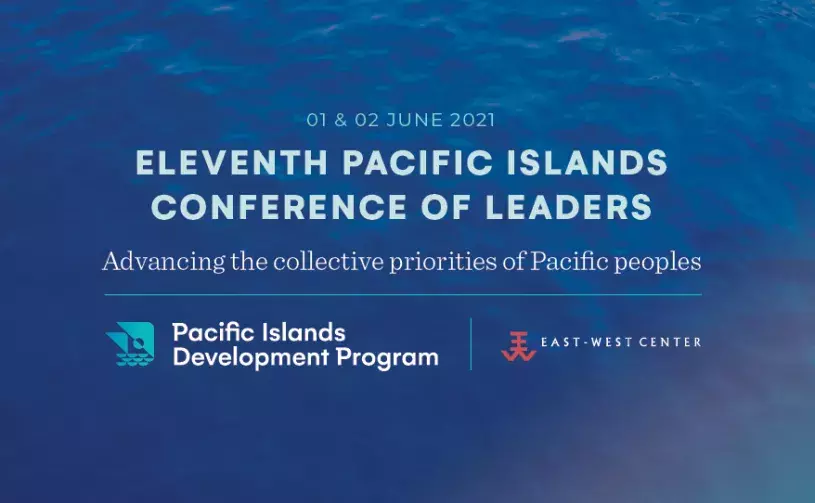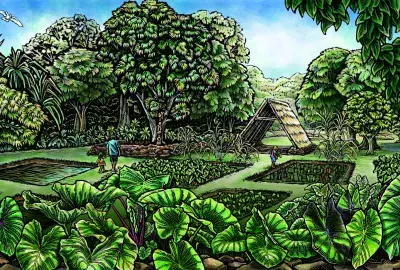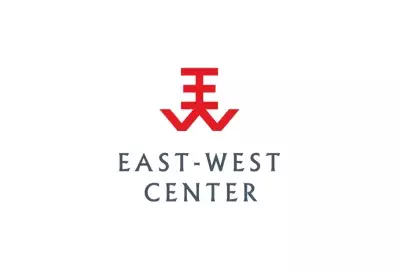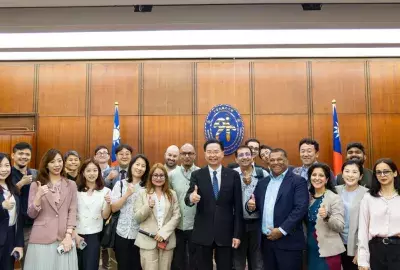Error message

OFFICE/DEPARTMENT
US Secretary of State Blinken tells leaders America is committed to work together on pandemic recovery, climate crisis
HONOLULU (June 2, 2021) – The leaders of 11 nations and territories across the Pacific met virtually for four hours yesterday, the first day of a two-day online gathering of the Pacific Islands Conference of Leaders (PICL). The meeting aims to recommit a new group of Pacific Island leaders to the important regional role of the PICL and its Secretariat, the Pacific Islands Development Program (PIDP) based at the East-West Center in Honolulu.
Dr. Richard R. Vuylsteke, president of the East-West Center in Hawai‘i, which hosts the PICL summit meetings, welcomed the leaders to the online gathering. After decades of working closely with Pacific Island states and communities, he said, the Center is dedicated to supporting “the critical function and purpose of the Pacific Islands Conference of Leaders in shaping and implementing regional development agendas.” (View a special welcome video for the leaders.)
Message from US Secretary of State
In a video message to the group, US Secretary of State Antony Blinken said America is committed to assisting Pacific communities’ recovery from the COVID-19 pandemic through vaccine donations and helping devastated island economies rebuild “in a way that’s sustainable and inclusive”.
Calling the climate crisis an existential threat to the Pacific Islands, Blinken cautioned: “We’re out of time for excuses. Countries must make—and meet—ambitious commitments, and governments need to invest in climate adaptation measures that all our communities will need.” The US is now leading by example on this front, he said, with the Biden administration’s goal of reducing carbon emissions by at least half by 2030.
Blinken said that the Pacific region faces a “shared challenge in threats to the rules-based international order,” with “economic coercion across the region on the rise.” “The United States is all for more development and investment in the islands,” he said, “but that investment should adhere to international standards for environmentally and socially sustainable development and should be pursued transparently, with public consultation.… We’re stronger when we stand together on this, and that includes standing with our allies and partners in the region.”
Leaders discuss key issues
In a dialogue session, regional leaders unanimously agreed that their top priorities are to contain the COVID-19 pandemic and mitigate its long-term impacts, and to promote sustainable economic growth and development. Other shared priorities included expansion of access to information and communication technologies, the importance of regional harmony and diplomacy, and protection of ocean and natural resources. The leaders also highlighted PIDP’s important role in facilitating ongoing dialogue and action on these priorities, and in providing a bridge between the Pacific Islands and the United States and other international partners.
Election of PICL Chair
During yesterday’s session, the leaders also unanimously elected Federated States of Micronesia President David W. Panuelo to serve as the body’s new chairperson. In addition, they voted to endorse Dr. Mary Therese Perez Hattori to continue as interim director of the Pacific Islands Development Program and to schedule in-person meetings in 2022 and in 2025. Historically, the summit has convened approximately every three years.
Meeting to continue today
The leaders will reconvene for a final session on June 2 (Hawai‘i time), including a discussion with US Special Presidential Envoy for Climate John Kerry. The 11th PICL is meeting privately, but news releases will be issued as information becomes available.
Leader Delegations
The leaders (or their designees) of the following countries and territories are participating in the meeting:
- Cook Islands
- Federated States of Micronesia
- Fiji
- French Polynesia
- Guam
- Hawai‘i
- Marshall Islands
- Niue
- Northern Mariana Islands
- Palau
- Solomon Islands
About the Pacific Islands Conference of Leaders:
The Pacific Islands Conference of Leaders (PICL) summit was founded in 1980 by Hawaiʻi Gov. George Ariyoshi and Fijian statesman Ratu Sir Kamisese Mara as a forum for Pacific Islands leaders—regardless of political status and without formal intergovernmental protocol—to address shared issues, learn from each other’s experiences, and develop common approaches to policy. The summit also provides opportunities for the leaders to dialogue with US officials and experts.
About the Pacific Islands Development Program:
The Pacific Islands Development Program (PIDP) conducts a broad range of activities to enhance the quality of life in the Pacific Islands. Based at the East-West Center in Honolulu, PIDP was formed in 1980 at the specific request of the region’s leaders to help advance their collective efforts to achieve and sustain equitable social and economic development. PIDP also serves as the Secretariat for the Pacific Islands Conference of Leaders and is a member of the Council of Regional Organisations of the Pacific (CROP).
About the East-West Center:
The East-West Center promotes better relations and understanding among the people and nations of the United States, Asia, and the Pacific through cooperative study, research, and dialogue. Established by the US Congress in 1960, the Center serves as a resource for information and analysis on critical issues of common concern, bringing people together to exchange views, build expertise, and develop policy options.
US Secretary of State Blinken tells leaders America is committed to work together on pandemic recovery, climate crisis
HONOLULU (June 2, 2021) – The leaders of 11 nations and territories across the Pacific met virtually for four hours yesterday, the first day of a two-day online gathering of the Pacific Islands Conference of Leaders (PICL). The meeting aims to recommit a new group of Pacific Island leaders to the important regional role of the PICL and its Secretariat, the Pacific Islands Development Program (PIDP) based at the East-West Center in Honolulu.
Dr. Richard R. Vuylsteke, president of the East-West Center in Hawai‘i, which hosts the PICL summit meetings, welcomed the leaders to the online gathering. After decades of working closely with Pacific Island states and communities, he said, the Center is dedicated to supporting “the critical function and purpose of the Pacific Islands Conference of Leaders in shaping and implementing regional development agendas.” (View a special welcome video for the leaders.)
Message from US Secretary of State
In a video message to the group, US Secretary of State Antony Blinken said America is committed to assisting Pacific communities’ recovery from the COVID-19 pandemic through vaccine donations and helping devastated island economies rebuild “in a way that’s sustainable and inclusive”.
Calling the climate crisis an existential threat to the Pacific Islands, Blinken cautioned: “We’re out of time for excuses. Countries must make—and meet—ambitious commitments, and governments need to invest in climate adaptation measures that all our communities will need.” The US is now leading by example on this front, he said, with the Biden administration’s goal of reducing carbon emissions by at least half by 2030.
Blinken said that the Pacific region faces a “shared challenge in threats to the rules-based international order,” with “economic coercion across the region on the rise.” “The United States is all for more development and investment in the islands,” he said, “but that investment should adhere to international standards for environmentally and socially sustainable development and should be pursued transparently, with public consultation.… We’re stronger when we stand together on this, and that includes standing with our allies and partners in the region.”
Leaders discuss key issues
In a dialogue session, regional leaders unanimously agreed that their top priorities are to contain the COVID-19 pandemic and mitigate its long-term impacts, and to promote sustainable economic growth and development. Other shared priorities included expansion of access to information and communication technologies, the importance of regional harmony and diplomacy, and protection of ocean and natural resources. The leaders also highlighted PIDP’s important role in facilitating ongoing dialogue and action on these priorities, and in providing a bridge between the Pacific Islands and the United States and other international partners.
Election of PICL Chair
During yesterday’s session, the leaders also unanimously elected Federated States of Micronesia President David W. Panuelo to serve as the body’s new chairperson. In addition, they voted to endorse Dr. Mary Therese Perez Hattori to continue as interim director of the Pacific Islands Development Program and to schedule in-person meetings in 2022 and in 2025. Historically, the summit has convened approximately every three years.
Meeting to continue today
The leaders will reconvene for a final session on June 2 (Hawai‘i time), including a discussion with US Special Presidential Envoy for Climate John Kerry. The 11th PICL is meeting privately, but news releases will be issued as information becomes available.
Leader Delegations
The leaders (or their designees) of the following countries and territories are participating in the meeting:
- Cook Islands
- Federated States of Micronesia
- Fiji
- French Polynesia
- Guam
- Hawai‘i
- Marshall Islands
- Niue
- Northern Mariana Islands
- Palau
- Solomon Islands
About the Pacific Islands Conference of Leaders:
The Pacific Islands Conference of Leaders (PICL) summit was founded in 1980 by Hawaiʻi Gov. George Ariyoshi and Fijian statesman Ratu Sir Kamisese Mara as a forum for Pacific Islands leaders—regardless of political status and without formal intergovernmental protocol—to address shared issues, learn from each other’s experiences, and develop common approaches to policy. The summit also provides opportunities for the leaders to dialogue with US officials and experts.
About the Pacific Islands Development Program:
The Pacific Islands Development Program (PIDP) conducts a broad range of activities to enhance the quality of life in the Pacific Islands. Based at the East-West Center in Honolulu, PIDP was formed in 1980 at the specific request of the region’s leaders to help advance their collective efforts to achieve and sustain equitable social and economic development. PIDP also serves as the Secretariat for the Pacific Islands Conference of Leaders and is a member of the Council of Regional Organisations of the Pacific (CROP).
About the East-West Center:
The East-West Center promotes better relations and understanding among the people and nations of the United States, Asia, and the Pacific through cooperative study, research, and dialogue. Established by the US Congress in 1960, the Center serves as a resource for information and analysis on critical issues of common concern, bringing people together to exchange views, build expertise, and develop policy options.







